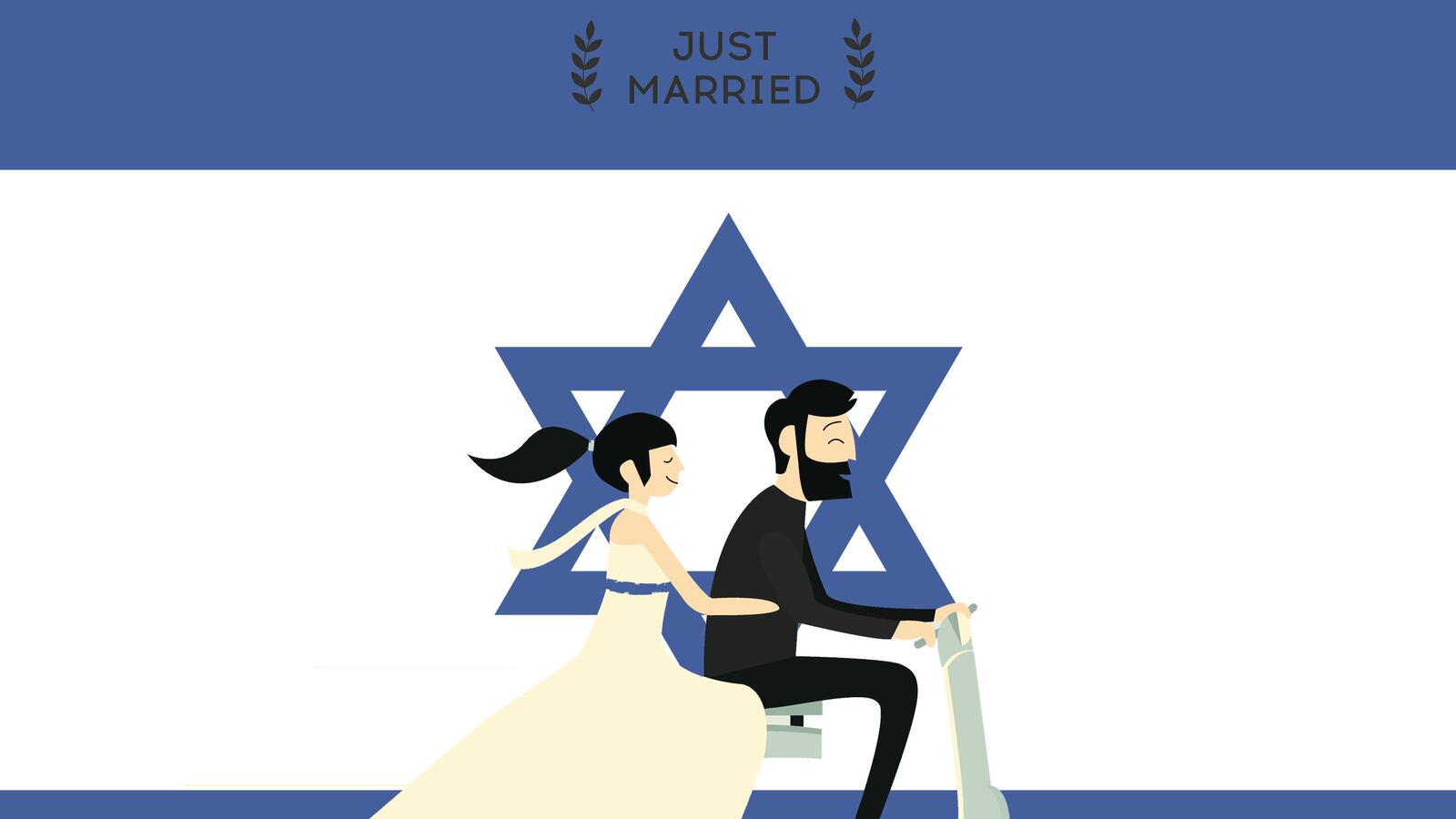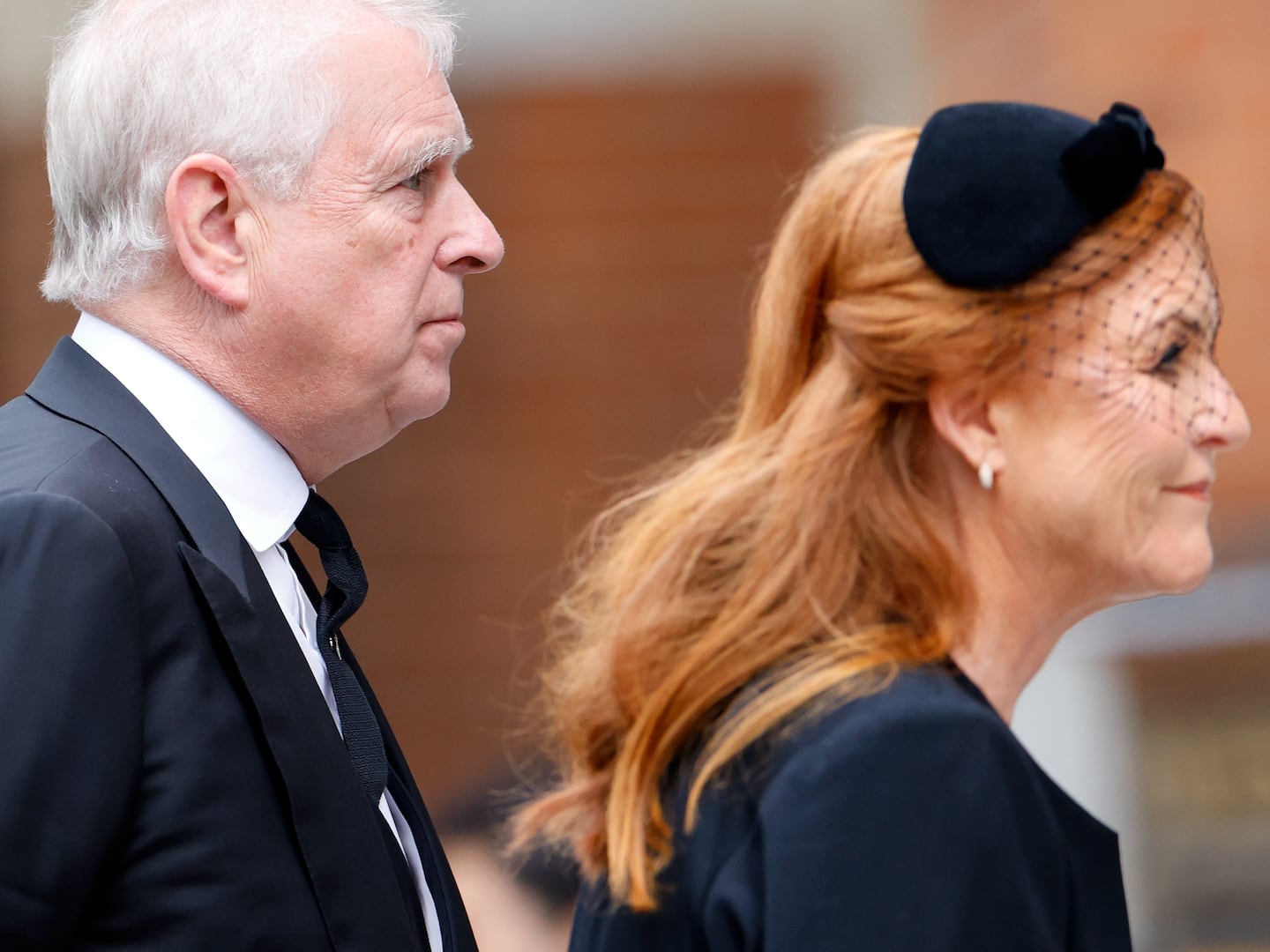I never considered marrying someone who wasn’t Jewish. The thought of wedding and starting a family with someone who was not a member of the tribe was not up for debate in my mind.
Or that was the case when I moved to New York City after college.
I assumed that in a city with over one million Jews, more than any other urban area in the country, sticking to dating within the faith wouldn’t be hard.
Now, roughly five years of post-college dating has got me rethinking that original conviction—specifically, the five years of seeing the same guy show up on Jswipe, then Bumble with a little purple Jewish star icon to indicate on this secular dating app that he’s NJB (Nice Jewish Boy), and that same guy messaging, scheduling a drink, and then flaking, sometimes trying to reschedule in a half-assed way, sometimes not.
I don’t mean to imply that such frustrating dating experiences are exclusive to courtship within the Jewish pool. It should go without saying these irritating experiences are a facet of dating across religions, as well as sexes and sexual orientations. When I feel dating fatigue, I think of HBO’s Sex and the City’s Charlotte York, who wailed “I’ve been dating since I was 15. I’m exhausted. Where is he?”
Charlotte has a few more years of dating experience on me, but that exhaustion resonates (and, ironically, WASPy Charlotte ultimately converts to Judaism for her husband, Harry).
It may be the biggest reason why now I give greater pause when a friend from college (Jewish but with an emphasis on the ish) says “Finding the right person is hard enough as it is. Why limit yourself?”
I turned to Naomi Schaefer Riley, who wrote 2013’s ‘Til Faith Do Us Part: How Interfaith Marriage Is Transforming America, for which she commissioned a study on interfaith couples.
Riley, herself, is Jewish and married a man who is not. I asked her if intermarrying tended to increase when, like me or Sex and the City’s Charlotte, we get older and, to be frank, we’re tired of the canceled drinks, the last-minute dates, the frustration.
“I definitely found that the older you are when you marry, the more likely you are to marry out,” Riley told me. However, she noted, it’s not “the stereotype that they’re desperate and marry anyone.”
Rather, Riley explained, “I think it’s we’re all putting marriage off later and later, and that decade between twenty to thirty is a time when we’re not that religious, traditionally. We’ve left our parents’ home; we’re living in this single netherworld, moving to different cities. All these factors put the pressure on people not to be part of a religious community. Their lives are so transient.”
If your religion isn’t playing a significant (or any) role in your social life, it doesn’t necessarily make sense that the romantic partner you pick at this time would share your religion. “A lot of people say marriage is an issue of opportunity —the people we go to school with, work with,” Riley said. “If you’re not a part of a religious community, attending services regularly, the chance you’ll marry someone in that community drops significantly.”
Perhaps, then, it’s no wonder that the rates of Jewish intermarriage have been growing since the 1960s and are pretty darn high. According to a 2013 survey from the Pew Research Center, the rate of intermarriage among non-Orthodox Jews is 71 percent.
Thus, statistically, as an American Jew who is not Orthodox, there are overwhelming odds that I will, ultimately, marry someone who is not Jewish—if I marry at all (the fast-growing number of single Americans suggest there’s also a decent shot I won’t wed).
Moreover, it’s not just, as Riley referred to, “an issue of opportunity.” The logic behind exclusively marrying someone who shares your religion doesn’t necessarily seem compelling in a modern and increasingly secular society.
Paul Golin, the Executive Director of the Society for Humanistic Judaism and co-author of How to Raise Jewish Children Even When You’re Not Jewish Yourself spoke to me about his own experience marrying someone who wasn’t Jewish.
Like myself, Golin was raised in the Conservative Judaism, so less observant than the more traditional Orthodox community but more so than Reform.
“I grew up with messaging from my parents, my rabbi, and my community that I should only be with Jewish women. My mother was born in a displaced person’s camp in Berlin right after the war because her parents lost their homes in the Holocaust. My grandma told me regularly, ‘If you’re marrying someone who is not Jewish, you’re finishing what Hitler started,’” Golin said.
At the same time, Golin said he “received this counter-message,” meaning he was also taught by his community and family to “judge everybody as an individual. If you’re judging people for their race, their religion, or or their socioeconomic status, you’re the worse for it—except when it comes to who you marry. I felt that was a very hypocritical message growing up.”
Golin said his family’s views on his marrying outside the Jewish faith had significantly changed by the time he walked down the aisle “Here’s a secret,” he told me with a laugh. “If you wait until you’re 36 to get married, your folks are just so happy you’re getting married.”
He even sensed a change of heart in his grandmother when she met his then-girlfriend, now-wife, who is of Japanese heritage. After meeting her at a family event, his grandma, who was hard of hearing, shouted, “‘Japan saved some Jews during the war,’” Golin recalled. “I took it as, ‘Okay, I got my grandma’s stamp of approval.’”
Golin’s story is an inspiring one. Yet, at the same time, it also reminded me of some of my friends who have not so-distant cousins who perished in the Holocaust; two generations later and an intermarriage or two along the way, they do not think of themselves as Jewish at all.
Granted, there’s hardly a simple and direct relationship between such full-on assimilation. Rather, I cite this example as one of the stories that reminds me that maintaining an identity is a concerted effort.
And it’s critical to me that I and any children I may have share that Jewish identity. I know that I ultimately desire my own Jewish family—a desire that feels especially strong around this time of year, the High Holidays.
As I attend my family’s synagogue and notice the young broods, sticky with pieces of apple and honey (traditional Rosh Hashanah food for a sweet new year), I cannot imagine a happy future without these milestones.
Then again, dating and marrying someone who is not Jewish is not necessarily mutually exclusive with such a future. The message of Sex and The City, and romantics and pragmatists alike is: you love who you love. Follow that and don’t be constrained by any boundaries.
Golin pointed out that “if you’re going to talk about millennials and the younger generation, half or more of them who consider themselves Jewish are from intermarried families.”
The same Pew Research Center study that showed the intermarriage rate for non-Orthodox Americans Jews at over 70 percent also revealed that a solid 59 percent of Americans aged 18 to 29 from intermarried families (where one parent is Jewish and one is not) identifies as Jewish.
As someone who is intermarried and currently raising her children Jewish, Riley certainly makes it seem like that Jewish family is viable. However, she stressed that it takes work and doesn’t come without “taboo” or difficult conversations.
“I am definitely in a distinct minority. I told my future husband on our first date I wanted to raise my children Jewish, and in most first date contexts, that would make me seem like a lunatic,” Riley said.
Bringing up those religious issues early on is critical to navigating an interfaith relationship, even if they’re frowned upon, especially if you’re a woman. “There’s a lot of pressure on women not to seem so serious early on in a relationship. The stereotype is they seem like nags,” said Riley. “That’s part of the problem.”
In her research for Til Faith Do Us Part, Riley found that half of the couples she interviewed didn’t discuss bring up these childrearing concerns until after they already said “I do.”
“It’s funny. On one hand, we date for longer; we feel we know so much about them [our spouses],” Riley said. “But, I found that half the people I surveyed didn’t talk about what religion they wanted to raise their children. How did you skip over that? You skip over it because it’s deeply uncomfortable.”
As I ring in the Jewish new year, I realize expanding my dating pool beyond the tribe could potentially give me more options, more chances at finding that match, in year 5777. But, what I really may need more of is mazel.






